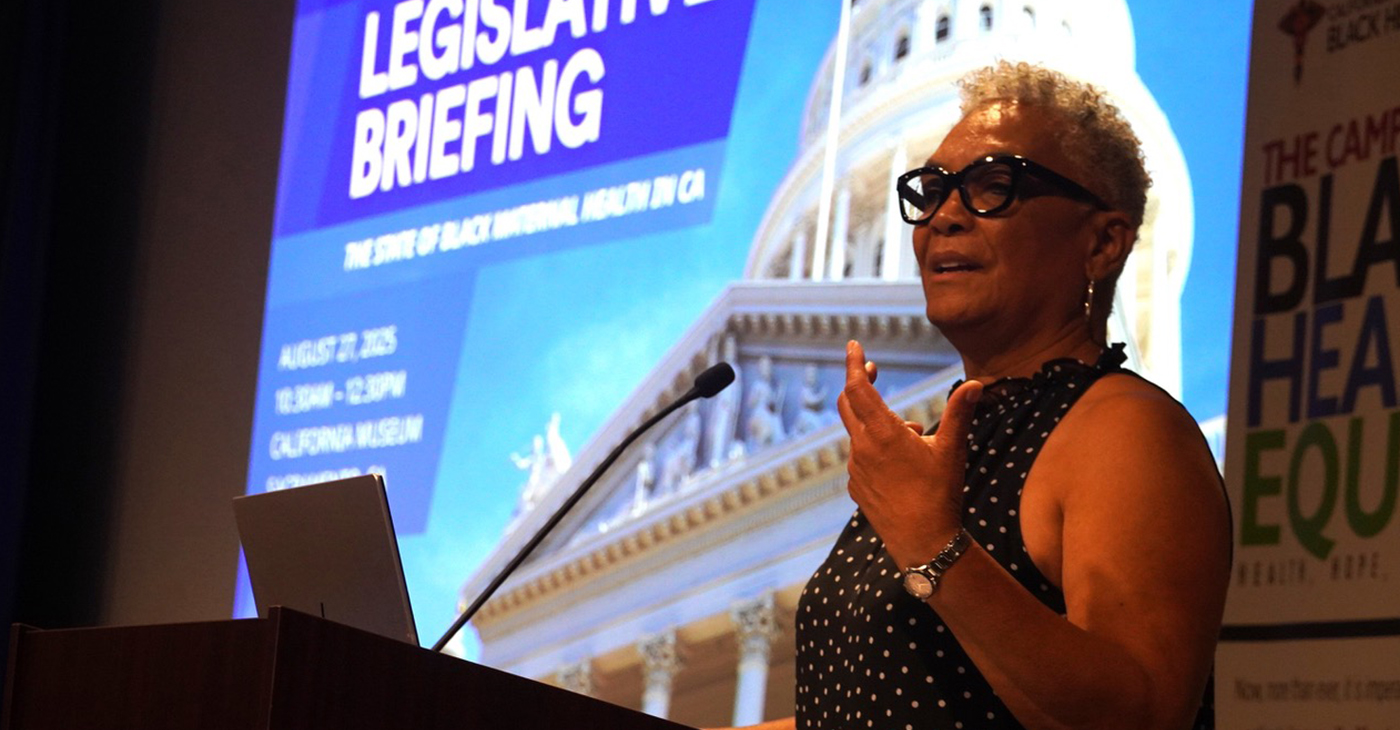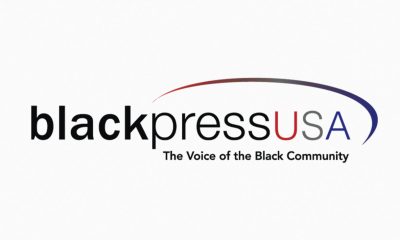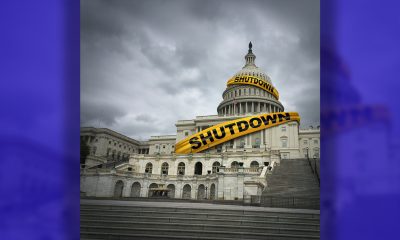Antonio Ray Harvey
A Ban on Book Bans: California Is Second State in U.S. to Pass Law
Before Gov. Gavin Newsom signed Assembly Bill (AB) 1078, legislation prohibiting book bans in California, he told Assemblymember Corey Jackson (D-Riverside), who authored the bill, “I appreciate you and your leadership.”

By Antonio Ray Harvey
California Black Media
Before Gov. Gavin Newsom signed Assembly Bill (AB) 1078, legislation prohibiting book bans in California, he told Assemblymember Corey Jackson (D-Riverside), who authored the bill, “I appreciate you and your leadership.”
“Remarkable,” continued the Governor. “We’re living in a country right now in this banning binge, in this cultural purge that we’re experiencing, all throughout America, and now increasingly here in the State of California, where we have school districts, large and small, banning books, banning free speech, criminalizing librarians and teachers.”
Newsom said codifying AB 1078 into law shows that California isn’t just “pushing back rhetorically” against what he describes as a “banning binge” happening across America.
AB 1078 also makes it illegal to censor instruction material and it mandates schools to provide access to textbooks that educate students about diverse cultures and people, according to Jackson, who was with the Governor when he signed the bill.
Newsom said Illinois passed a similar bill that takes effect in January. California is the second state in the nation to make it illegal to ban books or restrict learning material that includes information about the LGBTQ+ community, or specific races or ethnic groups. However, AB 1078 takes effect immediately because the Legislature passed it with an urgency clause.
On Sept. 7, AB 1078 passed in both the Assembly (61 to 17) and the Senate (31 to 9).
“We’re taking a firm stand against book-banning in California’s schools, ensuring that our students have access to a broad range of educational materials that accurately represent the rich cultural and racial diversity of our society,” said Jackson, a member of the California Legislative Black Caucus, that day.
AB 1078 requires school boards across the state to receive approval from the state Board of Education before stripping any instructional materials or books from classrooms and school libraries or “ceasing to teach any curriculum.”
AB 1078 now extends to cover school libraries, prohibiting any censorship or removal of books, instructional materials, or curriculum resources that state law requires be reflected in instructional materials.
The bill’s passage in both legislative houses demonstrates California’s commitment to preserving academic freedom, fostering diverse perspectives, and discouraging the practice of book banning, Jackson observed in an Aug. 21 statement.
Jackson introduced the bill after Temecula Valley Unified School District attracted attention when most of its schools barred a state-approved history textbook that features renowned politician and gay rights activist Harvey Milk.
Milk was assassinated along with San Francisco Mayor George Moscone on Nov. 27, 1978, 11 months after he won a seat on the San Francisco Board of Supervisors.
On Aug. 14, parent groups opposing AB 1078 voiced their opinions about Jackson Bill and AB 5, the “Safe and Supportive Schools Program” at a rally held on the southeast lawn of the State Capitol.
“This is not about your rights as a parent. There is no such thing as a parental right,” said Nicolette Vochelle from Southern California and a member of BLEXIT, a conservative community organization co-founded by Candace Owens. Vochelle was one of the speakers that participated in the rally.
“This is about our decisions as parents to raise our children as best as we possibly can and to choose the village and environment that they are raised in,” said Vochelle, expressing her opposition to AB 1078 and AB 5.
AB 5, which Newsom signed into law on Sept. 23, requires the State Department of Education to finalize the development of an online training delivery platform and an online training curriculum to advance LGBTQ+ “cultural competency” training for teachers.
According to BLEXIT’s website, the organization promotes economic independence, individual freedom, strengthening the nuclear family, and fostering a deeper appreciation for patriotism in Black American culture.
Vochelle told California Black Media that “Gov. Newsom, (Attorney General) Rob Bonta, and (Superintendent of Public Instruction) Tony Thurmond have zero rights to our children and it is beyond time that we remind them of that fact. We don’t give them another inch or second of our time to strip our children’s innocence. They will not be victims and they will not be confused. They will be protected.”
Jackson disagrees with Vochelle and other opponents of the legislation.
The lawmaker, who is openly gay, said AB 1078 will keep the path open to understanding, trust, equality, and knowledge in the classrooms. He believes that the bill will build a strong bond between schools and parents.
“California is the true freedom state: a place where families — not political fanatics — have the freedom to decide what’s right for them. With the passage of this legislation that bans book bans and ensures all students have textbooks, our state’s Family Agenda is now even stronger. All students deserve the freedom to read and learn about the truth, the world, and themselves,” Newsom said after the Legislature approved AB 1078.
Antonio Ray Harvey
$96 Million Allocated So Far to Black-Owned Firms as High-Speed Rail Project Expands Jobs, Boost Local Economies
Sen. Lola Smallwood-Cuevas (D-Los Angeles), a member of the California Legislative Black Caucus (CLBC) and Chair of the Senate Committee on Labor, Public Employment and Retirement, says the rail project “is exactly the kind of investment” California needs.

By Antonio Ray Harvey, California Black Media
As of May 31, the most recent data from the California High-Speed Rail Authority shows that 47 African American-owned firms are participating in the project as Disadvantaged Business Enterprises (DBEs).
A total of 936 Certified Small businesses are working on the high-speed rail program statewide, representatives of the high-speed rail project say.
The number of Black-owned DBE firms (5.2%) accounts for $96 million of the $1.136 billion allocated to minority firms thus far.
Sen. Lola Smallwood-Cuevas (D-Los Angeles), a member of the California Legislative Black Caucus (CLBC) and Chair of the Senate Committee on Labor, Public Employment and Retirement, says the rail project “is exactly the kind of investment” California needs.
Smallwood-Cuevas, speaking in Aug. 25 at the State Capitol Swing Space Annex — along with a coalition of Democratic state legislators and union leaders — provided an update on the California High-Speed Rail project and its efforts to employ people from the Black community and businesses.
“It builds a cleaner, more connected California while creating thousands of union jobs,” said Smallwood-Cuevas. “And we must ensure workforce equity, with pathways that open doors for workers who too often have been left out of good-paying careers.”
The remaining DBE minority-owned firms received the following amounts:
- Asian Subcontinent: 24 firms received approximately $65 million
- Asian-Pacific Islander: 52 firms received approximately $86 million
- Native American: 6 firms received approximately $39 million
- Hispanic/Latino: an unspecified number of DBE businesses received approximately $848 million
There are currently 328 certified DBEs participating in the project, according to the California High Speed Authority. The multi-billion-dollar project is billed to be committed to small, disabled, disadvantaged, and diverse businesses playing a major role in building the statewide high-speed rail project.
“As a Central Valley native, I know firsthand how transformative high-speed rail will be for our communities,” stated Assemblymember Lori D. Wilson (D-Suisun City) a member of the CLBC and Chair of the Assembly Transportation Committee.
“Stable and sustained funding is essential to delivering this project and fulfilling the promise made to voters.”
The news conference was hosted by Senate Transportation Chair, Sen. Dave Cortese (D-San Jose), who was promoting Senate Bill (SB) 545. He and the California High-Speed Rail Authority (CHSRA) urged the Legislature to commit to a steady, annual investment from a cap-and-trade program to fund the high-speed rail project.
Dr. Melanie Okoro, the Principal and Chief Executive Officer of Eco-Alpha, attended the briefing. Eco-Alpha is a Sacramento-headquartered small, women-owned, minority-certified firm.
The company, not classified as a DBE, earned its status as a certified small business and a certified women-minority small business through the California Public Utilities Commission (CPUC) and the Department of General Services (DGS). The certification allowed Eco-Alpha to be featured by CHSRA as a small business working on the project.
The Black-owned firm provides engineering and environmental services to the California High-Speed Rail project, primarily focused on facilities operation and Maintenance.
Okoro said laborers are not the only workers benefiting from the project. Professionals of color in engineering, with specialized knowledge and problem-solving skills to design, build, and maintain a wide array of structures, systems, and products, are looking forward to these “great opportunities.”
Activism
Sacramento: Lawmakers Hear From Health Advocates on “State of Black Maternal Health”
Participants highlighted several past and current bills going through the state Legislature that focus on improving maternal health equity. The proposals address systemic inequities to improve the healthcare experiences of Black women during pregnancy, labor, and postpartum.

By Antonio Ray Harvey, California Black Media
Adjoa Jones is a Los Angeles-based health and community leader who has dedicated her career to advocating for equitable birth outcomes for Black mothers and infants.
Participating in a legislative briefing hosted by the California Black Health Network (CBHN) on Aug. 27, Jones shared stories that shed light on the disproportionately high rate of pregnancy-related complications and deaths among Black women.
Two Black women in Southern California, Jones says, suddenly passed away after giving birth. From Jones’s perspective, those maternal mortalities could have been prevented.
“I come to you speaking from the voices of our community. From the stories of two unforgettable mothers, but it really speaks to the most preventable tragedies,” said, Jones, who is the Director of African American Infant and Maternal Mortality Prevention Initiative at the L.A. County Department.
“It’s not just impacting California, but our nation far and wide,” Jones added during the event titled “The State of Black Maternal Health” and held at the California State Museum in Sacramento.
Participants highlighted several past and current bills going through the state Legislature that focus on improving maternal health equity. The proposals address systemic inequities to improve the healthcare experiences of Black women during pregnancy, labor, and postpartum.
Panelists included Sandra Poole, Health Policy advocate for the Western Center on Law and Poverty, and Brittany Chambers, Associate Professor for the Department of Human Ecology at the University of California at Davis.
Other panelists were Palav Babaria, Deputy Director for the California Department of Health Care Services, and Zea Malawa, Director of Expecting Justice.
Rhonda Smith, the Executive Director of CBHN, served as the host and moderator of the briefing.
“There are amazing and incredible women who are doing amazing work here in the state,” Smith said of the panelists who discussed potential policy solutions and accountability.
During Jones’ presentation, she shared the tragic stories of two women. One was April Valentine, who died on Jan. 10, 2023, after giving birth at Centinela Hospital Medical Center in Inglewood.
According to reports, Valentine died from a blood clot, a pulmonary embolism, that formed in her leg and circulated to her lung. A well-known complication during pregnancy. Valentine’s family members said her condition was preventable, and they filed a wrongful-death claim.
The second woman, 32-year-old Briget Cromer, died in 2023 at California Hospital Medical Center, hours after giving birth to her fifth child. Her family believes her death was due to medical negligence.
Her family’s legal team filed a formal complaint with the U.S. Department of Health and Human Services (USDHH) alleging systemic racial bias in care.
According to the California Department of Public Health, Black women are more likely than their counterparts to die during pregnancy. They represent 5% pregnancies in the state but account for 21% of pregnancy-related deaths.
“We’re doing all that we can to ensure that pregnancy is uplifted (and) pregnancy is a place that’s where folks can enjoy the journey, Jones said.
Sen. Akilah Weber Pierson (D-San Diego), an obstetrician-gynecologist, was the keynote speaker.
“Here in California, we tragically lose another mother due to pregnancy-related complications every five days,” Weber Pierson said. “Here and nationally, Black mothers are three to four times likely to be one of those mothers lost. That’s coming from 40% of maternal deaths.”
Antonio Ray Harvey
Air Quality Board Rejects Two Rules Written to Ban Gas Water Heaters and Furnaces
The proposal would have affected 17 million residents in Southern California, requiring businesses, homeowners, and renters to convert to electric units. “We’ve gone through six months, and we’ve made a decision today,” said SCAQMD board member Carlos Rodriguez. “It’s time to move forward with what’s next on our policy agenda.”

By Antonio Ray Harvey
California Black Media
Two proposed rules to eliminate the usage of gas water heaters and furnaces by the South Coast Air Quality Management District (SCAQMD) in Southern California were rejected by the Governing Board on June 6.
Energy policy analysts say the board’s decision has broader implications for the state.
With a 7-5 vote, the board decided not to amend Rules 1111 and 1121 at the meeting held in Diamond Bar in L.A. County.
The proposal would have affected 17 million residents in Southern California, requiring businesses, homeowners, and renters to convert to electric units.
“We’ve gone through six months, and we’ve made a decision today,” said SCAQMD board member Carlos Rodriguez. “It’s time to move forward with what’s next on our policy agenda.”
The AQMD governing board is a 13-member body responsible for setting air quality policies and regulations within the South Coast Air Basin, which covers areas in four counties: Riverside County, Orange County, San Bernardino County and parts of Los Angeles County.
The board is made up of representatives from various elected offices within the region, along with members who are appointed by the Governor, Speaker of the Assembly, and Senate Rules Committee.
Holly J. Mitchell, who serves as a County Supervisor for the Second District of Los Angeles County, is a SCAQMD board member. She supported the amendments, but respected the board’s final decision, stating it was a “compromise.”
“In my policymaking experience, if you can come up with amended language that everyone finds some fault with, you’ve probably threaded the needle as best as you can,” Mitchell said before the vote. “What I am not okay with is serving on AQMD is making no decision. Why be here? We have a responsibility to do all that we can to get us on a path to cleaner air.”
The rules proposed by AQMD, Rule 1111 and Rule 1121, aim to reduce nitrogen oxide (NOx) emissions from natural gas-fired furnaces and water heaters.
Rule 1111 and Rule 1121 were designed to control air pollution, particularly emissions of nitrogen oxides (NOx).
Two days before the Governing Board’s vote, gubernatorial candidate Antonio Villaraigosa asked SCAQMD to reject the two rules.
Villaraigosa expressed his concerns during a Zoom call with the Cost of Living Council, a Southern California organization that also opposes the rules. Villaraigosa said the regulations are difficult to understand.
“Let me be clear, I’ve been a big supporter of AQMD over the decades. I have been a believer and a fighter on the issue of climate change my entire life,” Villaraigosa said. “But there is no question that what is going on now just doesn’t make sense. We are engaging in regulations that are put on the backs of working families, small businesses, and the middle class, and we don’t have the grid for all this.”
Rules 1111 and 1121 would also establish manufacturer requirements for the sale of space and water heating units that meet low-NOx and zero-NOx emission standards that change over time, according to SCAQMD.
The requirements also include a mitigation fee for NOx-emitting units, with an option to pay a higher mitigation fee if manufacturers sell more low-NOx water heating and space units.
Proponents of the proposed rules say the fees are designed to incentivize actions that reduce emissions.
-

 Activism4 weeks ago
Activism4 weeks agoDesmond Gumbs — Visionary Founder, Mentor, and Builder of Opportunity
-

 Activism4 weeks ago
Activism4 weeks agoFamilies Across the U.S. Are Facing an ‘Affordability Crisis,’ Says United Way Bay Area
-

 Alameda County4 weeks ago
Alameda County4 weeks agoOakland Council Expands Citywide Security Cameras Despite Major Opposition
-

 Alameda County4 weeks ago
Alameda County4 weeks agoBling It On: Holiday Lights Brighten Dark Nights All Around the Bay
-

 Activism4 weeks ago
Activism4 weeks agoBlack Arts Movement Business District Named New Cultural District in California
-

 Activism4 weeks ago
Activism4 weeks agoLu Lu’s House is Not Just Toying Around with the Community
-

 Activism4 weeks ago
Activism4 weeks agoOakland Post: Week of December 17 – 23, 2025
-

 Black History3 weeks ago
Black History3 weeks agoAlfred Cralle: Inventor of the Ice Cream Scoop





















































